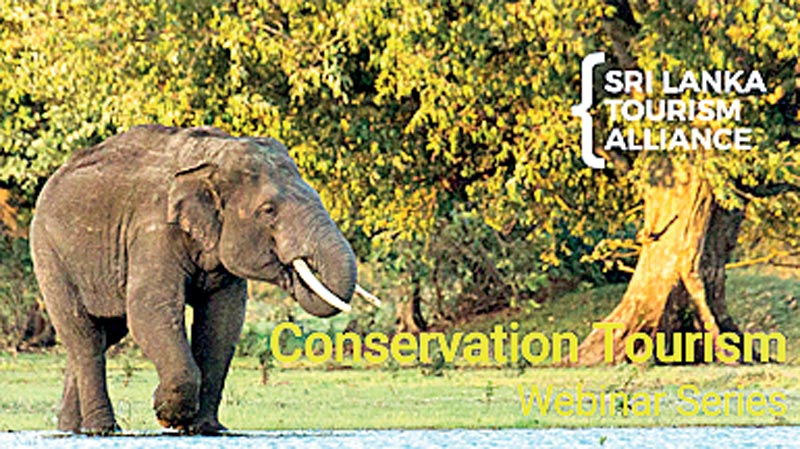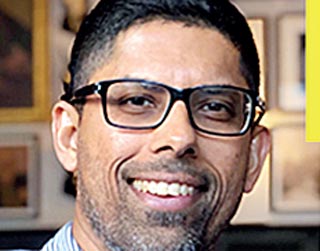Sunday Feb 22, 2026
Sunday Feb 22, 2026
Thursday, 25 November 2021 01:24 - - {{hitsCtrl.values.hits}}

 |
| Javana Fernando |
 |
| Souhaine Malalgoda |
 |
| Hashan Cooray |
 |
| Malik J. Fernando |
 |
| Niranga Gunaratna
|
Sri Lanka Tourism Alliance’s ‘Conservation Tourism Trailblazers’ webinar was held recently to discuss how protecting biodiversity can benefit tourism businesses. The webinar featured leading tourism operators in Sri Lanka who have established sustainable tourism businesses that are not only profitable but are also environmentally conscious.
The session was introduced by Sri Lanka Tourism Alliance Co-Chair Malik J. Fernando and moderated by Shangri-La Colombo and Shangri-La Hambantota Director of Communications and member of the Alliance’s Emerging Leaders program Niranga Gunaratna.
The panel consisted of Javana Fernando – owner and founder of Kulu Safaris and The Haritha Collection, Souhaine Malalgoda – owner and founder of Banyan Camp and Hashan Cooray – Manager of Marketing and Business Strategy at Jetwing Hotels. The panelists discussed how being environmentally conscious has allowed them to remain sustainable and profitable and attract the “conscious traveller” market, a rapidly-growing visitor segment.
Malik Fernando stressed that Sri Lanka’s nature and biodiversity were the primary reasons for tourists visiting Sri Lanka and therefore protecting nature is absolutely critical to sustain tourism in Sri Lanka. He went on to say that “ecotourism” should no longer be seen as a niche market and that all tourism businesses should be ecologically sensitive, for the future prosperity of Sri Lanka’s tourism industry.
Javana Fernando’s Kulu Safaris is a pioneering safari operation, established 20 years ago. Kulu Safaris offers “environmentally conscious camping” in Sri Lanka. Their no-plastic policy was implemented over 10 years ago including no single-use plastic bottles.
Javana’s ‘Haritha Collection’ of properties, including Kulu Safaris, Horathapola Estate, Kudakalliya and 3 Sisters, are proud to operate on minimum 70% renewable energy (solar power). Kulu Safaris and Kudakalliya which are both within elephant habitats, also pay special attention to elephant conservation by enforcing a strictly ‘no-fencing’ policy, which keeps elephants as well as other wildlife pathways from being blocked.
He highlighted that “instead of focusing on ‘Sri Lanka’s Big Five’, we should focus on ‘Sri Lanka’s Small Five Thousand’ and tourism operators should be educated to showcase more of Sri Lanka’s incredible biodiversity to guests, which in turn would act as an incentive to protect species, whilst providing guests with an authentic experience.”
Souhaine Malalgoda’s tourism offering ‘Banyan Camp’ was described as being “conscious and soulful”. He explained that from conceptualisation through to construction of the property and its day-to-day operations including F&B sourcing as well as the guest experiences are all sustainable, making this the main draw-card with tourists.
Souhaine emphasised that “nature does not need to be rearranged by man, it’s perfect as it is” and that increasingly tourists are willing to pay top-dollar to “immerse themselves in the therapeutic qualities of nature”, which provides a distinct advantage for tourism in Sri Lanka. He added that sadly Sri Lanka is losing that market advantage quite rapidly, by polluting our environment, destroying our forests and killing wildlife.
Hashan Cooray described how Jetwing’s six pillar Sustainability Strategy allows them to remain sustainable across all their properties with particular focus on biodiversity and energy conservation at Vil Uyana – their flagship conservation focused property where a barren chena-land has been developed into a wetland habitat. He highlighted how placing conservation objectives on par with commercial return enabled Vil Uyana to protect species like the Loris, which was previously considered endangered, and become a much sought after hotel now for ‘Loris Watching,’ one of the key-experiences they offer.
The panellists provided useful information to industry players on what they can do to make their operation environmentally sustainable and how they will benefit from that in the long run. Javana Fernando’s advice was to keep your offering “local and authentic” – providing quality local food and experiences allows you to attract high-yield visitors, whilst keeping your carbon footprint low.
Hashan Cooray noted that Jetwing was seeing a marked increase in the demand for wellness and nature-based experiences as well as for ‘serene locations’ – all of which are readily available in Sri Lanka, which should put us front of mind with global tourists.
Malik Fernando said: “We need to embrace ‘responsible tourism’. You’ve got to understand the importance of protecting Sri Lanka’s biodiversity and how that affects your business. For example, losing ‘The Gathering’ in Minneriya is going to affect your bookings wherever you are in Sri Lanka. It is our biodiversity that makes tourists consider Sri Lanka in the first place.”
The Sri Lanka Tourism Alliance hopes the Conservation Tourism Webinar series will encourage the industry as well as the country’s leading tourism operators, to contribute to Sri Lanka’s conservation needs at this critical juncture. The webinar is accessible at https://tinyurl.com/srilankatourismalliancewebinar.